In May 2020, the UK published its so-called Command Paper, outlining how the Northern Ireland Protocol would operate.
This was the document Stormont civil servants had been waiting for. They needed to start building infrastructure, hiring staff and expanding the capacities of entities like the Food Safety Authority (NI) and the Department of Agriculture (DAERA).
A big task was ensuring live animals and food based consignments coming in from GB and destined for hundreds of supermarkets complied with EU food safety and animal health rules.
Vets would have to be hired, Border Control Posts (BCPs) at Northern ports expanded, and customs and agrifood databases upgraded in order to be interoperable.
In 2020, everyone knew what was coming, and not just because the Command Paper spelled it out.
Even before the Protocol was agreed back in October 2019, Boris Johnson had published proposals that would form the basis of the deal two weeks later.
"Agri-food goods entering Northern Ireland from Great Britain would do so via a Border Inspection Post or Designated Point of Entry as required by EU law…," stated Johnson's proposal.
"They would be subject to identity and documentary checks and physical examination by UK authorities as required by the relevant EU rules."
However, in the spring of 2020 Robert Huey, the North’s chief vet and one of the officials tasked with putting Boris Johnson's vision into effect, was facing resistance from his minister, the DUP's Edwin Poots.
"There was a growing concern about the scale of checks because they knew that Huey, as chief vet, was not getting sufficient staff and was being blocked from recruiting by Poots," recalls a senior Stormont official.
Huey wasn't the only one concerned.

In the early part of 2020, the European Commission had been watching with growing disbelief as one UK minister after another, including Boris Johnson, dismissed talk of an Irish Sea border or documentary checks.
At the same time the Border Control Posts (BCPs) weren't being built, planning applications hadn't been lodged and tenders hadn't been issued.
The UK was simply not engaging on what needed to be done, said officials in Brussels.
"You know how long it takes to build anything, anywhere," a frustrated commission official said in late July, 2020.
"These are technically complex facilities that need to be staffed and tested, and doing all that in five months is quite a challenge."
Bernard van Goethem, a director at the commission's food safety division, had written to the UK's chief vet Christine Middlemiss in March and again in April spelling out the importance of having BCPs ready at ports.
BCPs were about food and live animals, a much more sensitive sphere of control than industrial goods.
They not only had to be built, they also had to be designated by EU officials as fit for purpose, van Goethem had written.
"There are designated BCPs and you can only operate through legal ones," one Stormont official said at the time.
"It’s not a matter of what Boris Johnson might or might not say. Prudent, large firms will only operate within the law."
The deadline for designating BCPs was 1 March 2020. That was pushed back to the end of June. As things began to drag, the EU was getting more and more anxious.
BCPs were becoming a touchstone of the UK's good faith in implementing the Protocol.
However, when it came in May, the UK Command Paper started to shift things.
Just after its publication, the Northern Ireland Executive collectively agreed that Poots and his department should take forward the work on BCPs.
It was politically toxic for the DUP, which, of course, was virulently opposed to the Protocol. The idea of buildings that gave concrete effect to an Irish Sea border was too much to stomach.
"The sticking point for them always was the appearance of new physical infrastructure," said the Stormont official.
When it came to putting that infrastructure out to tender in September 2020, four months after the UK Command Paper came out, Poots attempted to stop the process.
It put the relationship between Poots and his most senior civil servant, Denis McMahon, DAERA's permanent secretary, under strain. McMahon was spearheading the mammoth task of making Northern Ireland Protocol-ready.
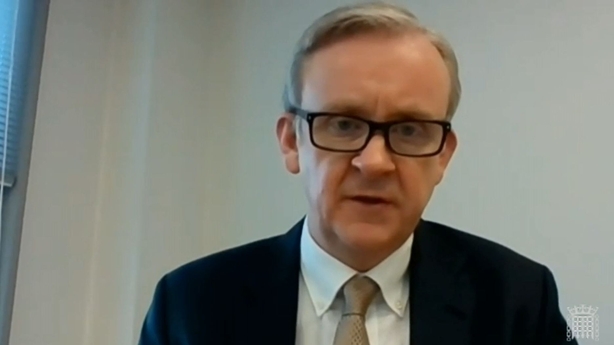
Dept of Agriculture, Environment and Rural Affairs
Later that September, he bravely tried to articulate his dilemma to the Stormont agriculture committee.
"I am absolutely required to comply with the law," he said.
"Because we've been put in an impossible situation as a result of the wider politics around this, we find ourselves having to navigate our way around this process…
"I am accountable to the Minister generally, but, in this case, I am acting against the Minister's wishes."
It's understood McMahon was concerned about complying with international law, and about his obligations under a code that applies to the Northern Ireland civil service known as MPMNI (Managing Public Money NI).
Poots's demand that the tender process be stopped potentially undermined the obligation to provide value for money.
Under the code, McMahon would have needed a ministerial order from the Department of Finance, accompanied by the approval of the Executive, to go ahead and stop the tender process.
However, in May the Executive had already taken the collective decision for the BCPs to go ahead.
On 10 September 2020, senior civil servants sought legal advice from the Northern Ireland Attorney General Brenda King on the Poots move.
The same day there was a meeting between civil servants and a number of DUP ministers over the legal issues raised by Poots's attempt to block the tendering process. It's understood the ministers were furious with the civil servants.
The next morning Poots was overruled by London. George Eustice, the Environment Secretary, wrote a letter not to Poots but to Denis McMahon ordering the tender process to go ahead.
"My view is that it is now the role of your department to procure the facilities for agri-food checks without delay," wrote Eustice.
As reported by the Belfast Newsletter at the time, Eustice did not order Poots directly (he ordered his senior civil servant), nor did he use powers that were available to him to compel Poots to act.
McMahon then sent a memo to Poots asking him to "note" that he must press ahead with the BCPs. It was clear that everyone was helping Poots create political distance between the DUP minister and the building of infrastructure at Northern ports.
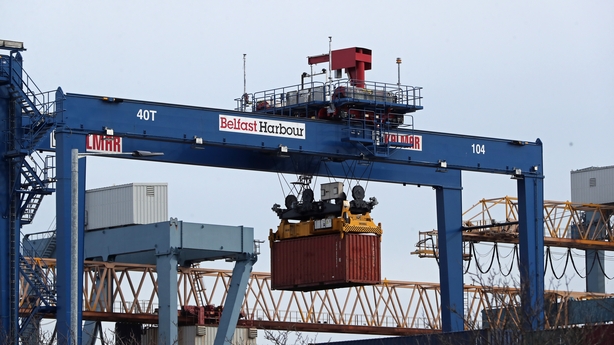
On 17 September, Brenda King came back with her legal advice.
"She made several key points," recalls one official. "One was that the Executive decision of 20 May [to proceed with BCPs] stood, and that everything flowed from that decision."
In the event, tenders went out and construction began. Some of the BCPs would be of the portacabin variety, as there was not enough time to construct permanent ones. But agriculture officials spoke of the heroism involved in getting a system up and running in such a short time period.
"There has been a heroic [effort] by Mark Livingstone [director of Brexit operational readiness] and his team and, indeed, the contractors to get there on time," Robert Huey, the chief vet, told the Stormont agriculture committee on 17 December 2020.
The same day, the EU's chief negotiator Maros Šefčovič and the UK's Michael Gove reached an agreement on softening the impact of the Protocol, which was due to come into effect just two weeks later.
There would be three month grace periods absolving traders from completing Export Health Certificates on a range of food products destined for supermarkets, and a lifting of the ban on chilled meats (sausages, mince etc) for six months.
In return for the grace periods, the UK issued declarations promising a labeling system to show that such products were only destined for Northern Ireland end-consumers and were not to be marketed for sale across the border.
As we know, the Protocol took effect on 1 January 2021. It has, to say the least, been a rough ride, politically and logistically.
There were the initial weeks of "teething troubles", trucks getting stranded, empty shelves, an appalling lack of readiness by GB traders.
Then when the horticultural sector got hit, and Amazon parcels stopped getting sent, the Protocol attracted deepening unionist hostility.
The EU's abortive attempt to link Article 16 with vaccine exports prompted the UK government to adopt a downright hostile attitude to the Protocol, which has been there ever since (and which led the UK to unilaterally extend grace periods, prompting EU legal action in response).
Despite all the political turbulence (and sporadic street disturbances) there has not been a clear and detailed picture of how the Protocol has actually been operating on the ground.
That is until now.
Between 21-30 June last year, a team of officials from the European Commission's food safety division (DG SANTE) visited Northern Ireland to audit the checks and controls on food products and live animals entering what is termed the EU's sanitary and phytosanitary (SPS) area.
A draft version of the 41-page audit was completed on 4 October last year. It was not made public, or shared with member states, since it needed the response of the UK authorities.
However, on 28 January the Northern Ireland agriculture department announced it was placing the draft, which had still not been seen by EU capitals, in the library of the Assembly.
Its contents were, in the words of one EU source, "explosive".
Roughly speaking, the Protocol’s approach to food imports to Northern Ireland is meant to work as follows: consignments should have health certificates, data should be pre-notified electronically to the EU system before consignments leave GB, documentary checks are done in advance, identity checks are done by officials at GB ports who check seals on lorries, and some physical checks are done on lorries when they arrive at BCPs in the North.
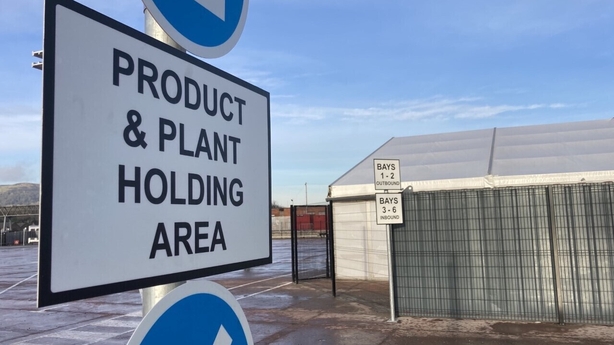
Goods arriving at their retail destination or warehouse would be scanned into the system.
The operation has to run on sufficient staffing levels, and regular and timely cross-checking of data between the UK’s customs division (HMRC), Border Force, DAERA vets, the Food Safety Authority in Northern Ireland, and so on.
The scale of the operation is certainly daunting.
Between January and June 2021, 60 consignments of agrifood goods arrived at BCPs from the rest of the world; by contrast, 55,186 consignments (including live animals) arrived from GB.
However, auditors found the entire system was not fit for purpose, even though the inspection covered some of the grace periods (ie, when the full spectrum of checks were not actually applying).
There was a litany of shortcomings: chronic staffing levels, goods not being properly checked, multiple agency IT systems not interacting, agencies not having the legal basis to do what was required, multiple errors and gaps in food safety certificates, lorries not being officially sealed.
Almost 60% of veterinary posts were unfilled; the Food Safety Authority needed an extra 56 environmental health officers; DAERA said 20 plant health inspectors and six administration staff were still needed.
Because of the lack of staff, agriculture officials were triaging checks, but even then were not able to check many high priority consignments.
The commission team was reminded that Edwin Poots had halted recruitment in February 2021, and that situation was still in effect when the audit took place in June.
Officials told the EU team that "the timeframe for the recruitment of replacement or new staff would be at least six to nine months" if the recruitment ban was lifted.
Listen: Brexit Republic - Dormant Stormont?
Lorries which were supposed to turn up at BCPs for physical inspection weren't doing so; one sample showed that 17 out of 43 export health certificates had errors and 32 out of 43 were either not correctly completed, or the information was at odds with other documents.
Horses were not unloaded for identity and physical checks; food products were ending up in supermarkets without the labeling that the UK had promised; lorries were proceeding ahead to retail outlets without waiting for the results of the checks at BCPs.
When it came to the UK's commitments on chilled meats, the report stated "none of the specific undertakings given by the UK in its unilateral declarations have been complied with, particularly concerning documentary and labeling requirements".
At one point the commission team was told that inspecting day-old chicks coming in from GB would involve just a checking of the seal, with a follow up check at their destination 24 hours later, one which was limited to "to a very brief opening of the vehicle doors and cursory visual inspection of those birds at the back of the consignment".
More worrying from an EU perspective, inspectors found that "for one road vehicle, three out of the seven consignments transported… went to their destination in another Member State [ie, south of the border] without completion of the official controls and validation of the [certificates] at the BCP of arrival".
This is relevant to the current negotiations.
Simply put, the UK has said that goods clearly staying in Northern Ireland should not be checked at all, while goods clearly going to the South should be, and that traders should be trusted to alert the authorities which category they fell into.
To put it mildly, the audit will not instill confidence in member states that such a bespoke model will work.
When Maros Šefčovič published his proposals on reducing checks last October, there was one key paragraph that may have been overlooked.
It stated: "Any EU move towards a bespoke solution is subject to a number of pre-conditions, such as the UK delivering on access to IT systems in the customs area and completion of the construction and staffing of permanent Border Control Posts, in accordance with the findings and recommendations of the Commission's recent audit report ..."
Those negotiations on the EU proposals are ongoing, despite the chaos around Boris Johnson in Westminster, the collapsing institutions in Northern Ireland, and Edwin Poots' attempt to suspend checks.
Relations between Brussels and London were already tense ahead of the latest convulsions.
On Monday during a phone call, Maros Šefčovič complained to Liz Truss about the Foreign Office video which circulated on social media, attacking the Protocol.
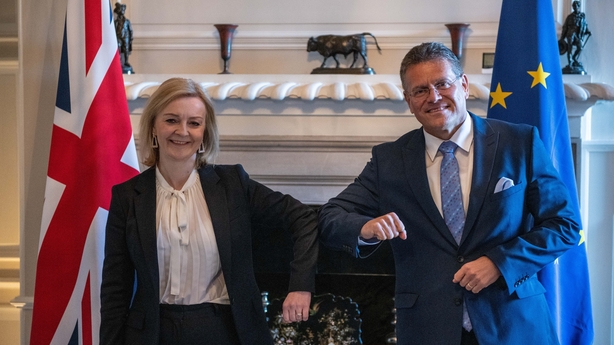
The video carried an array of familiar complaints - "the Protocol is putting the Good Friday (Belfast) Agreement at risk", "the Protocol prevents the free flow of goods between Northern Ireland and the rest of the UK", "the Protocol is negatively impacting community groups" and so on.
Officials in Brussels pointed out that the message was entirely one-sided and could have been written by the DUP.
Some Brussels sources are also wondering as to why Edwin Poots, who would have approved publishing the draft European Commission audit, decided to do so just before ordering his officials to stop checks at ports.
Given that the audit highlights his role in frustrating the recruitment process, he can certainly use that to burnish his electoral credentials.
However, the report lays bare how poorly the Protocol is being implemented. The central concern of member states is about food safety and the precise traceability of products entering the EU's single market. The audit will do nothing to reassure them.
Furthermore, despite the change in style and tone with the arrival of Liz Truss, the technical talks between EU and UK officials have yet to make any breakthroughs.
Is there scope for an agreement before the end of February?
Jeffrey Donaldson revealed to the BBC's Good Morning Ulster programme yesterday that Boris Johnson had put the chances at between 20% and 30%.
There were intensive talks at technical level in Brussels this week, with a focus on customs formalities. The EU says they can be reduced by 50%, but the UK has contested that figure.
"The UK is very focused on going even further and eliminating some of the formalities altogether," says one EU diplomat. "A lot of the discussion revolves around safeguards, databases - how you can monitor and verify the control of goods.
"A lot of customs experts are involved on this. There are detailed discussions, but there has been no convergence."
Brussels had been watching Edwin Poots's threats to suspend checks carefully. While officials expected it to happen, they were surprised by the timing.
Is there a suspicion that the UK had somehow colluded in the Poots gambit?
Asked if London would intervene if the checks were suspended, Liz Truss told the Belfast Telegraph it was a "matter for the [Northern Ireland] executive" to decide upon.
The remarks were noted in Brussels. On Thursday, and ahead of Truss's video conference with Šefčovič, similar pronouncements by other ministers were raising alarm bells in Brussels. These abated as the UK government then rowed back and spoke of getting legal clarification.
The UK has denied that it knew the Poots move was coming. However, it all appeared a far cry from George Eustice's firm order to Northern Ireland civil servants to press ahead with BCPs back in September 2020.
While some diplomats hope that talks intensify and that they could bear fruit, the events of this week have prompted a more pessimistic narrative in Brussels.
"It sounds like it's certainly a way of trying to make clear that the Protocol isn't working," says one source.
"Because we [the UK] are doing everything to make sure that it doesn't, and trying to force a crisis."
By forcing a crisis, it also absolves the UK of having to resort to Article 16.
If the UK stepped back from triggering it back in November, when it became clear that the EU could respond with a trade war, then today it doesn't need to reach for the Article 16 option (in recent weeks Truss has been referring to "safeguards" without mentioning the Article).
The collapsing institutions in Northern Ireland and a toxic election campaign means the state of turmoil is sufficient to ensure the checks are still not being carried out and everything is up in the air.
Cynics argue that what is unfolding now is doing Article 16's work, without the threat of a trade war.
That Jeffrey Donaldson, the DUP leader, should threaten to walk away from the Northern Ireland Executive even after the elections, unless the Protocol is resolved to his satisfaction, is a scenario that has been entirely predictable, and predicted.
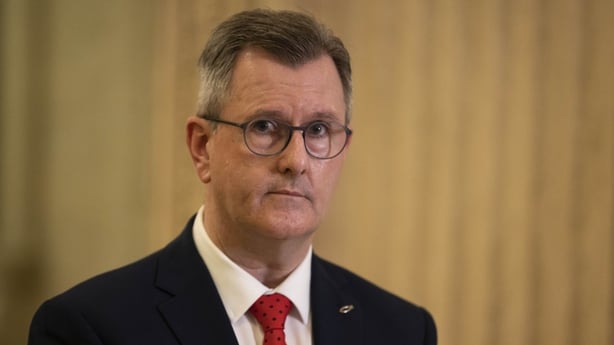
On 13 January, one EU official asked: "Do we return to a situation [after the Assembly elections] where there is no executive? Could we have a deal [in the Protocol negotiations] if there's no Executive?"
The current climate also leaves Liz Truss free to stay close to the Tory backbenchers, especially those in the ERG, who she will depend upon to replace Boris Johnson, should a leadership challenge happen.
In other words, she can enter such a contest without triggering Article 16 (and the risks that that would entail) but at the same time keep the ERG on board with her rhetorical blasts at the Protocol (and the occasional sniping video).
At the same time, member states and the European Commission will be in a bind. Threatening to revive legal action while talks are ongoing, and the climate in Northern Ireland is highly charged, will be avoided.
Diplomats say the disruption of an election has already been priced in.
"There always was an expectation that the closer we got to the election campaign, the political situation would become fragile and difficult, and things will be said and done that will make life more complicated," says one diplomat.
However, the fear expressed during Lord Frost's time, that the UK was trying to turn back the clock through a fundamental renegotiation of the Protocol, has not dissipated with the arrival of Liz Truss.
"We're basically back to the trilemma of 2017 [i.e, the need to reconcile a hard Brexit with no border on the island of Ireland]," says one source.
"Except now it’s worse, because at that time there was more trust that the UK government was actually trying to do something in the interests of Northern Ireland.
"Now you're dealing with the people who screwed Northern Ireland over and over again, starting with the referendum, starting with Brexit."







